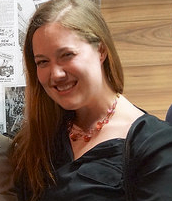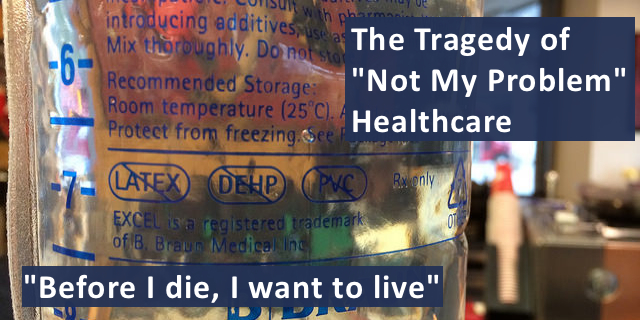“Never impose on others what you would not choose for yourself.” — Confucius, The Analects (c. 500 BC)
What happens when people, working in healthcare, choose to ignore pain and suffering? What happens when a patient or caregiver complains? Here’s an eye witness account of what happened to one young woman.
“I was there to soften the blow of threatening letters from clinicians refusing her care… I’ve stood there while clinicians, including some I deeply admired, all checked a mental box for triage and passed her to a never-named “someone else.” ~Whitney Zatzkin
Jess Jacobs, MS, a 29 year old graduate of University of California-Berkley with a masters in health systems administration from Georgetown University, died on August 13, 2016. She was an online patient activist, a sister, daughter and friend. Many remembrances have already been posted. Whitney Zatzkin’s is a beautiful tribute.
Georgetown University, died on August 13, 2016. She was an online patient activist, a sister, daughter and friend. Many remembrances have already been posted. Whitney Zatzkin’s is a beautiful tribute.
“I had a flashback while starting this post, to the first day of my third year of medical school – the first day…that medical students spend time in the hospital helping to care for patients….at evening sign out, the medical resident in charge of our education and safety taught us the acronym “NMP.” It stood for “not my problem,” uttered after a beeper page was responded to about a patient that was not under our care. That moment conveyed important messages to me – that this was going to be brutal, and she was going to shield us, which she did. I would only later ask the question, ‘from what?'”
A Casualty of “Not My Problem”?
Jess had invisible diseases (in social media parlance-a spoonie), Ehlers-Danlos Syndrome and Postural Orthostatic Tachycardia Syndrome (POTS). Ehlers-Danlos is mainly an inherited, connective tissue disorder–characterized by loose joints, and fragile skin–but which can affect other organs. Although Ehlers-Danlos Syndrome is classified as rare, the Ehlers-Danlos Society states that it is may be more common than the stated prevalence of 1 in 2500 to 1 in 5000.
According to Dysautonomia International, POTS is not rare, affecting between 1 M and 3 M people in the US. It is a disorder of the

Walking Gallery by Regina Holliday: “When I painted her jacket, I depicted one of the times she fell faint to the pavement. She woke to find strangers looking down upon her. “
autonomic nervous system, the part of the nervous system that controls body functions, like heartbeat, digestion and breathing. Diagnosis of POTS is difficult but one of the symptoms is dizziness and fainting. A person with POTS has an increase in their heart rate when they stand up, their total amount of blood may be low, and they may have an increase in norepinephrine in their blood.
Jess fainted often.
After getting her degree at Georgetown, Jess worked for the Department of Health and Human Services in mhealth, telehealth and health innovation. She left the federal government to work for Aetna as a Director with Aetna’s Innovation Labs. Being an innovator, she embraced patient engagement and joint patient-physician decision-making. This, along with her health systems background and innate intelligence, is why, when she interacted with the healthcare world, she pushed.
For example, she shared on her blog, a letter she received from her primary care physician:
Hi Jess,POTS is a rare diagnosis, and I am by no means a specialist in the treatment of it. I cannot comment on whether treatment with opioids is the best route or not. My only suggestion was that it might be prudent to see another POTS specialist for an opinion. It might also turn out to be helpful to see the Rheumatologist and Neurologist to see if they have any thoughts or ideas.I know this is beyond frustrating for you, feeling poorly and not having any therapies pan-out with respect to making you feel better. There are no clear answers when it comes to POTS.Best wishes,Primary Care Physician
Dear Primary Care Physician —
I know all too well how complicated and rare POTS is. I’ve lived with this diagnosis for five years. It’s ok that you are not a specialist in the condition. I am….As to the realities… I haven’t left the house to go anywhere except physician appointments this year. I have a wheelchair….
As to the pain and condition prognosis, please remember that POTS is secondary to my underlying Ehlers-Danlos…the reason my joints swell, pop in and out of place, and are a source of pain…
The majority of my friends are allied [to] the healthcare field… and all ask “who’s coordinating all of this?” to which I say I am and then they all stress about who is going to take over when I start puking and can’t get off the floor on my own.
I’m not sure where they got the notion that my primary care physician should coordinate my care, maybe they were looking at NCQA’s patient centered medical homes model, or found a copy of the Accountable Care Organization regulations from CMS…. All I know is that they all say that a PCP is the person to coordinate care.
By telling me that my condition is complex and stating that I should just see additional specialists, you are surrendering….So, this leads me to ask: If you are not willing and able to help me, who in your practice is?
Best,
Jess
A Casualty of Engagement? Social Sharing
Although the above letter is confrontational, Jess was also a funny person who shared her experiences during her many hospital stays with humor and warmth. But she could not stand idly by. In one DC hospital stay, she described having to use her cell phone to call the nurses station for herself and her roommate.
My roommate, admitted for a Sickle Cell crisis, cried hysterically for over 12 hours while her pain remained unmanaged. During this time I called and emailed the patient advocate several times on my roommate’s behalf and ‘rang’ the nurse countless times. Eventually my roommate’s attending came to see her. Unfortunately her physician … insisted my roommate’s issues [were]related to positive thinking and refused to revert to a pain regimen that had apparently worked before. I’m not a physician and have no idea what pain medications this girl should have been on. But as a human I know that “Tears = Bad” and anyone that cries for twelve hours while begging someone, anyone, to call their physician of record isn’t faking it. She didn’t stop crying until a doctor with some humanity sedated her following shift change. The complete disregard for her pain stripped her of her dignity and brought me to tears.
When Dr. Y visited me during a two-week stay in July, I thought Hospital X had hit rock bottom. During this stay my roommate’s bloody vomit sat clogged in the sink for three days before someone came to plunge it.
Jess was lucky because she had friends.
As things were advancing for Jess, my spouse, Jake, and I were soon in her “first responder unit” — a small team of friends in DC that sought to catch her when she fell, or maybe it was more to make sure she had a gentle landing. We’d keep her company during hospital stays and, eventually, help advocate and fight for her basic rights in the health system. We’d coordinate her care when no clinician would — with the resourcefulness of our MSF-Doctors without Borders friends abroad. We didn’t have to go abroad to a remote nation state to serve where most needed, we just had to look about a block into DC.
Being Ahead of Healthcare Leadership
 But her excellent education in healthcare systems unfortunately didn’t help her. She lived in our nation’s capital surrounded by huge healthcare institutions that are some of the best in the US. Yet healthcare failed her. When she pushed back at healthcare leaders, she experienced resentment and push back in the form of loss of healthcare services.
But her excellent education in healthcare systems unfortunately didn’t help her. She lived in our nation’s capital surrounded by huge healthcare institutions that are some of the best in the US. Yet healthcare failed her. When she pushed back at healthcare leaders, she experienced resentment and push back in the form of loss of healthcare services.
“Being facile with Google, having open data, and APIs galore can’t save people who at critical times need a good doctor. Not friends who are doctors, your own doctor who prioritizes your health and does what needs to be done…Despite the good intentions of the let patients help community, patients can’t play doctors. …[doctors] do have a purpose though, and they (the doctors) cost society a lot of money to create. We should be made to deliver the value on the debt we owe society for allowing us to be who we are. But then, are patients ….strong enough to make this ask? Based on being an hour in the hospital with Jess, post-getting-yelled-at, post-merciless gaze from the people in the white coats, I’m not sure, and it’s not fair.
I guess then, it’s “let patients help” and “make doctors help.” Or actually, it’s “create doctors that help.” There’s a concept in medical education known as the “hidden curriculum.”
Realizing that it was likely that my engagement was going to do more harm than good, I limited my engagement. So did many of the doctors that she interacted with. The difference is that those doctors were her doctors, paid to work on her behalf. Their training must have been the same as mine because I could tell the acronym “not my problem” was underlying a lot of the behavior.”~Ted Eytan, MD
What about the people who don’t have the resources, the education, the friends and connections or even access to hospitals?
One blogger discussed the “Not My Problem” attitude as a workflow breakdown.
Relative to healthcare’s ‘Not My Problem’ culture…there most definitely is a workflow angle. Here is a quote from Business Process Management Systems: Strategy and Implementation.
“In the BPM organization, delivering customer value and optimizing process performance are two central goals….This discourages the “not my problem” mentality and the practice of throwing issues over the functional wall.”
Ethics
 But “Not My Problem“ NMP is about ethics. In this reflection on the Modern Hippocratic Oath that medical students repeat upon graduation:
But “Not My Problem“ NMP is about ethics. In this reflection on the Modern Hippocratic Oath that medical students repeat upon graduation:
“I look back to the wisdom and guidance of Hippocrates everyday as I struggle to balance my duties, patient rights and allocation of hospital/societal resources for the sake of underprivileged and acutely ill mothers and their unborn children.
It is particularly evident in this modern era when more students are choosing residencies in radiology, anesthesiology, and pathology for the sake of their lifestyle. [They] tend to openly complain about excessive clinical workload despite obvious patient needs. Many of these individuals rationalize a “shift-mentality” as their future practice of medicine that justifies going home when they are “off-duty” despite any other professional obligations. It appears that “job quality” is a priority when compared to “professional duty” in the medical practice of these particular future physicians.
Some of this new breed of colleagues also have a public display of disrespect for the indigent, confused, and simplistic patient. Instead of becoming an advocate and/or protector of society’s weakest element, they would discard this needy population in preference for the medical procedure, economizing their clinical practice or optimizing their time at home with family and friends.
Nursing is not off the hook as can be found in numerous descriptions on Jess’ website and in her twitter feed. Nurses take this oath at their pinning ceremony:
“I solemnly pledge myself before God and in the presence of this assembly, to pass my life in purity and to practice my profession faithfully. I will abstain from whatever is deleterious and mischievous… With loyalty will I endeavor to…devote myself to the welfare of those committed to my care.”
Nor are those in administration who should be serving.
If “Not My Problem” happened to Jess, it will happen and is happening all over this country. It’s Everyone’s Problem.







I have encountered this type of thinking so often. I told several Dr’s that I felt they were playing “hot potato” all praying that when the music stopped they would not be the one holding the bag who actually had to do something Of the half dozen specialists they are all aware that my health is failing, I am not functioning, and am suffering more and more. Yet each looks only at their narrow field, declares that it is marginally acceptable and passes me on. Each of them fully realizing that on the whole I am failing fast. But that is not their problem. I have finally found a PCP who is trying, but having come into the game late its hard.
Our healthcare system is badly broken. It is controlled not by health care providers, but by insurance magnates and business men. I asked my former endocrinologist about communicating with another specialist and he informed me that time spent on such communication was “not in today’s business model of medicine.” I was dropped from one practice because the PCP was spending too much time on me, (the Dr left that practice and moved hours away).
For now the ins. co”s CEO’s are laughing their way to the banks, Dr’s are frustrated and patients are suffering and dying. Hippocrates must be having fits.
Hi Kathryn, Thank you so much for sharing your experience here. Your eloquence in describing your experience confirms this story. I’m glad you finally found a primary care physician who is trying to help you. Best, Kathleen
I have a new PC. I am being treated for myelofibrosis, thrombocytopenia, and hemolytic anemia. I am fortunate to be treated by an MPN specialist. I am on the only FDA approved drug for this disease. When I began to take it, it worked immediately. The PCP, who was admittedly not familiar with myelofibrosis was suspicious of this response and told me “it was probably an emotional response”. Are you kidding me? What a ignorant thing to say, as if I am only responding to this drug as a placebo? He kept saying “but you don’t have cancer”, and yes, I do. Myelofibrosis is a blood cancer that causes fibrosis in the bone marrow eventually. There is no cure unless the patient is a canidate for a stem cell transplant. After trying to find a new PC when mine retired, and finding one my insurance would approve of, I’m not in townhe position to look for other PCP’s-of which there are none in my area. Being forced to go to this PCP by my insurance is a joke. He has no idea what to say or how to treat me.
Hi Debora, thank you for your comment. I so appreciate you sharing your experience. Jess Jacob’s experience is not an isolated incident. It is happening to many people. I’m glad that you have a specialist who is helping you.
It is our problem….very sad commentary of today’s healthcare system. There are many suggestions I have to this post and would love to talk to Jess Jacobs regarding them. She was her own advocate but wanted/needed the team to help her. We can and need to do better.
Anne thank you for you comment. I agree that her team needed to help and to do better. Passing a patient off to other physicians because the patient advocates for herself is not acceptable. But it did happen to Jess. And it is happening to other patients as well.
Hi Kathleen,
Sad story, but nevertheless not uncommon. “NMP” syndrome is probably a consequence of an ever growing “specialization” of the medical profession where nobody feels capable to adopt a holistic approach to patient care, and to assume responsibility for managing the healing process until steady healthy state is achieved.
Least of all GP’s, who are not trained for continuous health management. At best they are trained to do primary triage and to refer “the problem” to a specialist who will probably relate to the “problem” but not to the patient and his or her combined status. This, combined with the ever growing physician fear from being held liable for a non-favorable treatment outcome (including the risk of being sued for malpractice in the process) leads to the development of a “defensive” kind of medical practice where the care giver is trying to cover ass by strictly adhering to recognized “protocols” and juggling the hot potato to someone else’s table.
I don’t say these things to judge care givers, who are mostly worthy human beings but merely to describe system phenomena.
We could relate to this using terminology from business process management as I think someone has already suggested and you quoted in the post.
The first thing we do is look for a “process owner”. This should be the person most affected by the process outcome, so naturally is also the stakeholder with the most interest and motivation to assume responsibility to ensure process success.
With this definition in mind when looking at possible candidates, it becomes gradually clear that the “process owner” of the healthcare process is no other than the patient himself. He risks the most in the process and has the most to gain if the process succeeds.
So, uncomfortable as this may sound, the patient (while in possession of undamaged mental faculties) should assume responsibility for managing his own health.
At first glance, this notion may sound unorthodox to preposterous. How can a patient with no medical training manage his own health care?
Well, it is not easy but it becomes necessary. We saw that the system is broken.
As to medical knowledge – it is readily accessible on the internet, and available from
the medical professionals. We just have to redefine our relationship with the system
and become its active managers instead of passive objects. We have to learn about our health problems, ask tough questions, demand clear understandable answers from healthcare professionals, weigh risks, consider care alternatives (including non-conventional and alternative medicine) and ultimately make an informed decision the best we know how, and commit to seeing it through.
It is not easy, but it is effective. Research clearly shows that motivated, involved patients have a better chance of recovery.
As I said before, it is NOT easy. In the process you may have to educate prominent specialists, doctors used to making decisions about YOUR health without really consulting with you. You have to convey the message that now you are the boss and they work as YOUR advisors, technicians and sources of information, and you will ultimately be the senior partner in the decision making process, and you are no longer a “passive problem” to be disposed of as they see fit.
It will be tough getting the notion across, but you will be surprised at the amount of cooperation you will receive if you are assertive and consistent about it.
Remember, this is not a one-time effort! You must take a continuous interest in your health and assume the responsibility to learn about it and manage it.
But don’t worry, you ha an extraordinary diagnostician at your side. After all, who knows how you really feel better than your own self?
Hello Haim, Thank you for your comment. I agree that this is not an easy process. Jess’ story, especially the fact that she was extremely well versed, activated, advocating and involved, is heartbreaking. The fact that she was passed around from physician to physician, even though she was an “active manager” of her health, is cause for enormous concern. It is a tragedy and one that is happening to many others. Please read some of the other comments.
What an arresting, moving and tragic post. Perhaps “Not My Problem” reflects that these clinicians do not have any good solutions to offer. The limits of conventional medicine are found pretty quickly by those with poorly understood conditions.
At this point, the lucky patient may hear about and decide to try functional medicine, a more systems-based diagnostic and treatment process. Here the doctor doesn’t name the disease and prescribe the magic pill, but takes a systematic look at all the factors influencing one’s health, which can include triggering exposures both external and internal, biocompatibility of medical devices, dental materials with the help of a biologic dentist, etc. Sort of like running comprehensive diagnostics on your car, cleaning what needs to be cleaned, tuning it, and putting the right kind of fuel in the tank.
That would be nice for people with tons of money to pay for it. My insurance doesn’t cover functional medicine.
A moving story. However, having many relatives in the DC area, not totally surprising. Here’s the thing: we health care insiders are too considerate. Why not name the hospitals? What are they going to do, sue for defamation? I wouldn’t name doctors, but if you had a car problem, you would name the brand. Patient activists who work within the system can be too considerate. If a problem is persistent, we need to push back with public accountability. IMHO. I didn’t know Jess, but know others who did. She sounds like an extraordinary individual.
We based our post on Jess’ blogposts, tweets and the blogs of her friends. They did not name hospitals so Medivizor did not name any hospitals. You have a good point and I would urge you to investigate this further and share what you learn. Thank you for your comment. Kathleen
Well, that was a real NMP response.
If you can, please be more specific so that I can respond. Thank you.